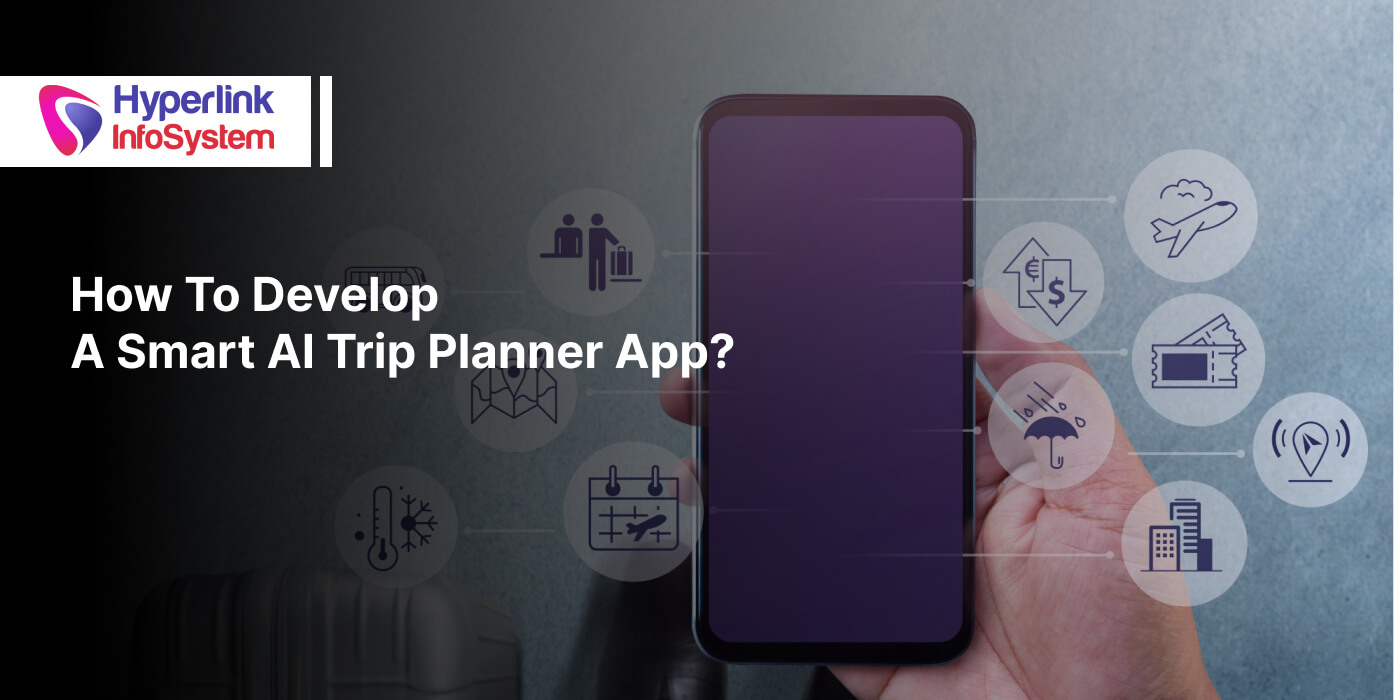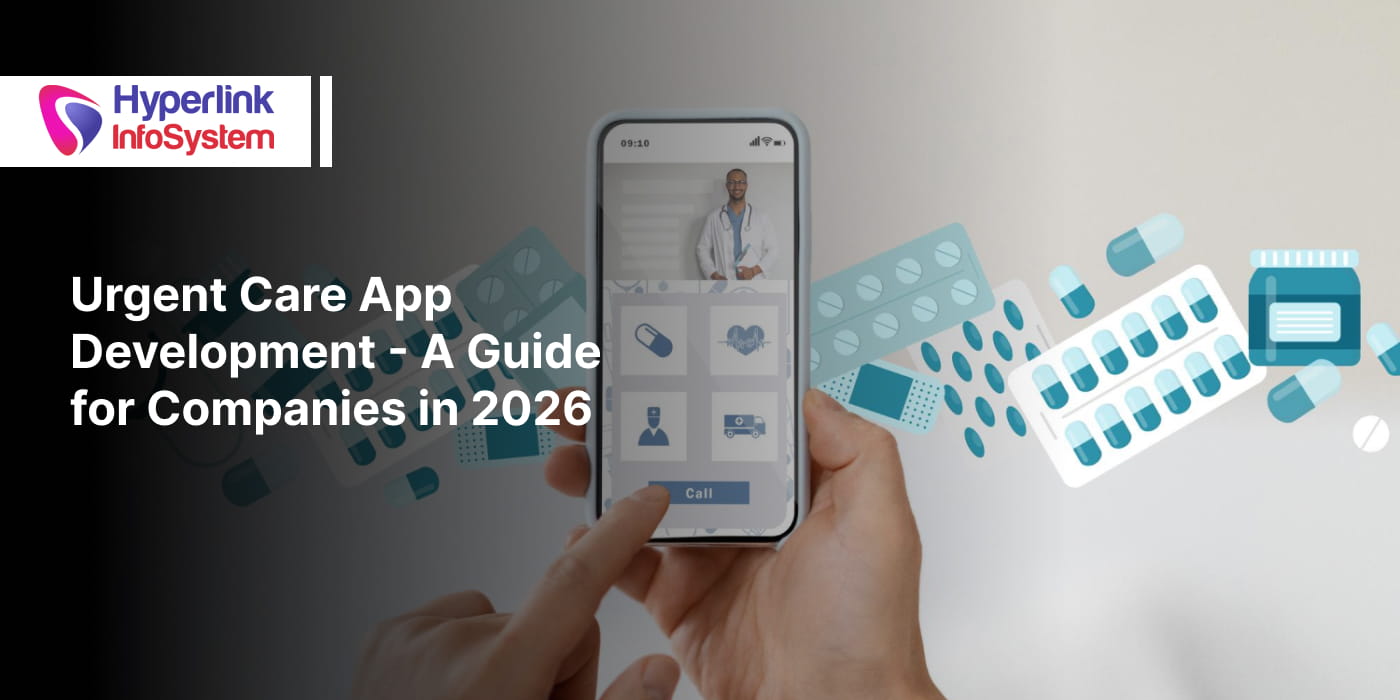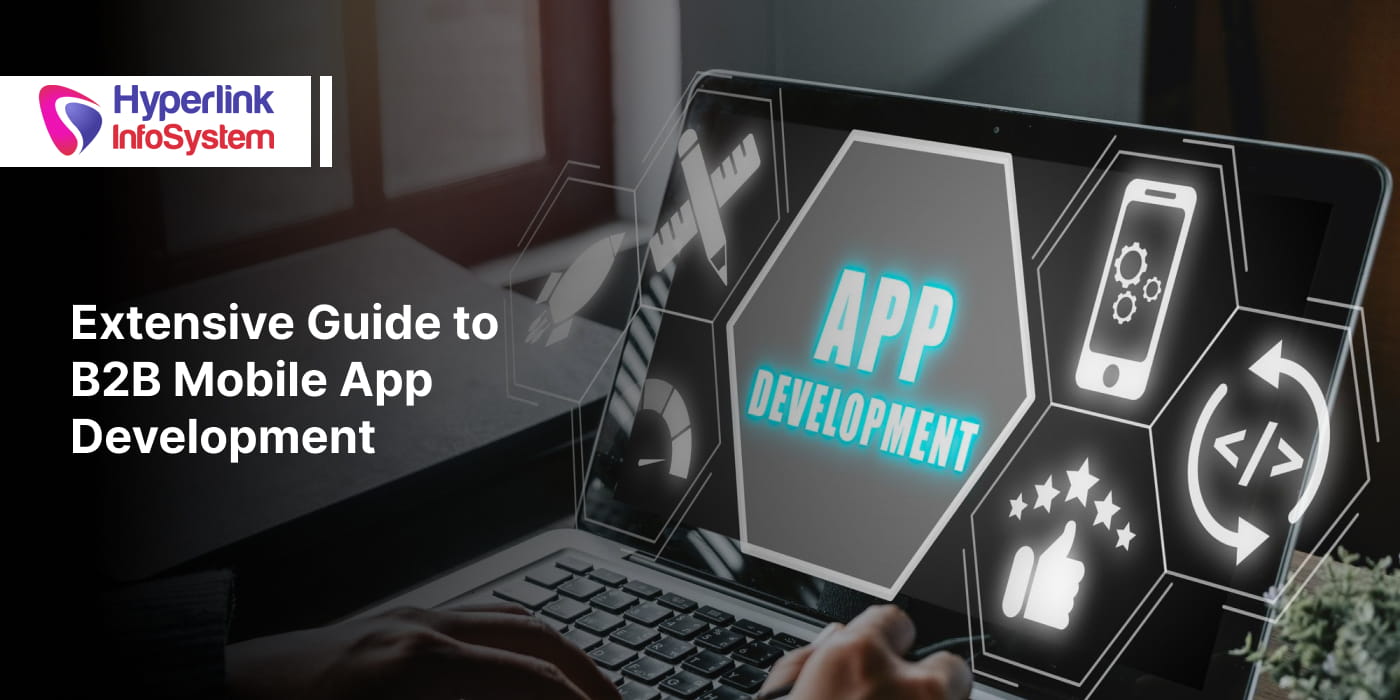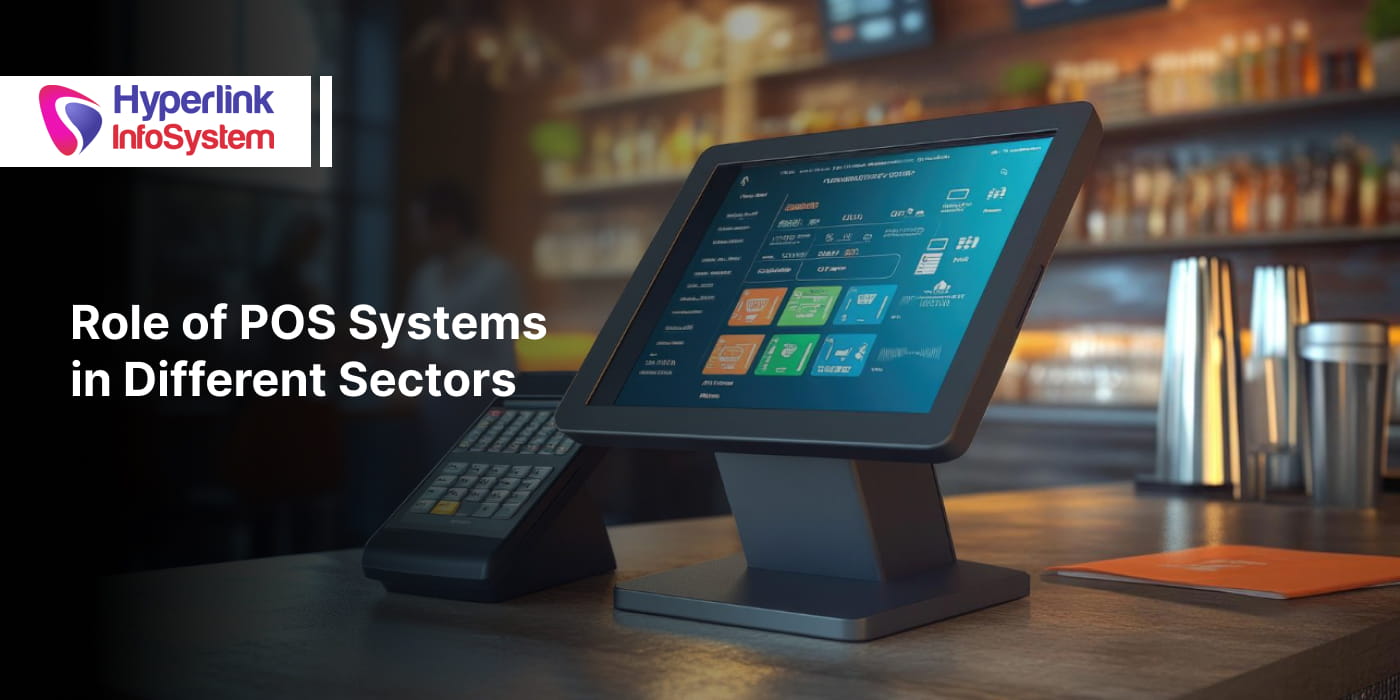How To Develop A Smart AI Trip Planner App: Features, Cost & Development Guide
Jul 2025

Plan a trip and you have to juggle multiple browser tabs, spreadsheets, and far too many lists of “Top 10 Things to Do.” But AI intervenes in the process, and the whole way of planning a trip has changed.
Travelers of this day and age want more than basic itineraries; they look for smart experiences that evolve around their budget, interests, and time. AI travel app, accordingly, has begun picking up steam as it helps users lay out an entire trip in minutes with suggestions that feel like they were made just for them.
Now, BuildAI comes into the picture, sparking a frenzy among startups and businesses to finish developing their own AI trip planner apps that take the agony of planning out of travel. So with trip planner AI, the traveler no longer needs to do the planning. He just explores.
From giving the weather forecast to planning the shortest routes to revealing little hidden treasures, AI is transforming how we go about sightseeing by generating customized itineraries for each sightseeing journey.
What is an AI Trip Planner App?
Imagine a scenario where you just tell someone to plan a 5-day trip to Chicago for under 1 lakh INR, and they instantly give you the list of full itineraries with flights, hotels, tourist places, food places, everything. Imagine a machine or an app doing all of this on your command. Yes, that's AI.
An AI trip planner app can automate your travel planning process with personalized recommendations and suggestions from your earlier preferences and history. Along with that, it also gives you real-time data like weather and traffic details so that you can be prepared for what's ahead.
Here’s how it works:
- You enter your preferences—destination, travel dates, budget, and activities.
- The AI processes tonnes of data (routes, hotels, ratings, timing, local trends).
- In seconds, it creates a custom trip plan—often with options to tweak or book directly.
Unlike traditional tools, where you piece everything together yourself, AI travel apps handle the heavy lifting. You don’t just get a list—you get a plan.
Popular examples?
Tools like Roam Around use ChatGPT to generate custom itineraries. Journey Plan helps users get guided plans with local insights. And many startups are now using platforms like BuildAI to develop intelligent trip planner apps that adapt in real time.
In short, AI trip planner apps don’t just save time—they make travel smarter, smoother, and way more enjoyable.
Also Read, AI in Telemedicine - Most Popular Apps, Challenges, Costs
Top Features of a Smart AI Travel Planner App
Smart travel AI apps are serious assistants when it comes to planning a trip in real-time, contrasting with the human lifetime hours that go into travel research. Trip planner AI and trip booking apps assist in alleviating the confusion through dynamic real-time weather, sociodemographics, and insights from users. We take it upon ourselves to sift through must-haves for AI trip planner app developers that can make user experiences unforgettable.
1. Personalized Itinerary Generator
The big selling point of any AI travel app, though, is its ability to generate tailor-made itineraries. This is more than just putting destinations in a calendar. AI goes back to your interests, history, and preferences so that it can generate a customized itinerary for you according to your vibe.
2. Budget and Time Optimization
In theory, AI plans trips. However, in a real sense, AI optimizes them. Given some budget and travel dates, users want to maximize the experience without having to pay the price for it.
A wise planner will sift through alternative costs concerning airlines, hotels, local transport, and attractions to piece together something suitable to the users' own budgets, yet rich in experiences. Imagine a personal analyst working for your travels, crunching numbers behind the scenes for you to enjoy.
3. Real-Time Weather & Traffic Data
After a gruelling week at work, the plan of a nice hike suddenly seems gloomy, watching the forecast predictions of hours of downpour. A well-built AI assistive app would pull in live feeds of weather and traffic data to amend its plans accordingly.
Just like the plan must be changed in the case of a traffic jam or impending rain, it reassesses and switches its priorities right then and there. There is no room for flexibility without AI.
4. Seamless Booking Integration
Users want everything in the same place from planning to booking, everything. You can provide your customers with everything by integrating different APIs so that your app can become a one-stop shop for your customers.
5. Chat or Voice-Powered Travel Assistant
By offering chat or voice-powered AI assistants, you can provide your customers with a friend who is available for them 24/7. Such AI chatbot or voice assistant can answer questions like "What's the best cafe nearby?", or "When is the next train available from the nearest station?"
This makes the entire planning experience very easy and engaging.
6. Offline Mode & Collaborative Planning
Travel may not always come with Wi-Fi. Offline access to the itinerary, map, and booking confirmation is necessary, especially for international users.
Since you travel with your people, make sure that the app also supports collaborative features like group planning and trip sharing, and other related features. A well-designed and well-planned AI trip planner app helps users to get everything on one app at once and helps them through the entire journey.
How Does AI Power Trip Planning?
Behind every “wow, that’s exactly what I wanted” moment in a smart AI travel app, there’s a powerful engine of AI technology working its magic—quietly, quickly, and brilliantly. But how exactly does AI turn scattered travel ideas into a fully optimized plan? Let’s see.
Machine Learning + NLP = Travel Genius
At the core of every intelligent AI trip planner app lies a combination of Machine Learning (ML) and Natural Language Processing (NLP).
- Machine Learning registers pattern recognition: for example, if you like beach destinations or if you like to take the earliest flight.
- The NLP knows how you speak. Type in "Plan me a 4-day solo trip to Himachal under ₹20K," and the AI interprets your intent, budget, timeline, and even mood.
Combining these two makes your app feel less like a tool and more like a smart travel buddy who really "gets you."
The Power of Data & APIs
You'll feel like AI is smart but actually, AI is well-informed and well-trained. It gathers data from real-time resources to build plans. For example,
- Flight and hotel APIs (Skyscanner, Amadeus, Booking.com)
- Weather and traffic APIs (OpenWeatherMap, Google Maps)
- Local events, restaurant listings, and reviews (TripAdvisor, Yelp, etc.)
The AI engine sifts through this information in milliseconds to offer the "best" and not the obvious choice.
It Gets Smarter Over Time
One of the biggest benefits of using a trip planner artificial intelligence? It learns. The more a user use the app, the better the recommendations become.
- Prefer local homestays over hotels?
- Hate overnight travel?
- Love museums but skip malls?
The AI notes these patterns and customizes future trips accordingly. It’s not just planning—it’s learning how you travel.
This continuous feedback loop is what transforms a basic AI trip planner project into a truly next-level user experience.
When you set out to build an AI trip planner app, you’re not just creating software. You're creating a pocket travel partner who learns your choices and gives you recommendations based on that. With the right data, ML models, and tech stacks, one can build a limitless AI trip planner app.
Step-by-Step Guide to Build an AI Trip Planner App
From this point on, you have the idea. You know AI is the future of travel.
Here is a step-by-step roadmap:
1. Market Research
When you have a program to be built, you first need to be clear about it. Is your target traveler maybe a budget backpacker, a luxury traveller, or a family vacationer? Study competitors like Roam Around or Journey Plan. Figure out what's missing and what your app can do better.
Look into search trends for key phrases such as "AI trip planner build AI" or "AI travel app" to get a clear understanding of what users are actively pursuing. This is the road your success lies.
2. UI/UX Design Strategy
Your app isn’t just a planner—it’s a travel companion. Make sure it looks eye-catching and easy to use. Provide an app with an interface that feels intuitive. A well-designed UI earns trust fast—especially for first-time users.
3. AI Model Training or API Integration
Here’s where the real magic happens. You can either:
- Train custom AI models using machine learning and NLP to generate dynamic itineraries based on user input.
- Or integrate existing tools (like GPT models, BuildAI, or third-party AI APIs) to speed things up and keep costs down.
This step shapes how smart—and how human—your app will feel.
4. Backend and Frontend Development
Here, the design and AI logic are integrated and actualized.
- Frontend (Flutter/React Native) for providing users with a smooth experience on both iOS and Android.
- A backend (Node.js/Python) to take care of user data, AI logic, and database connections, as well as booking requests.
Working very quickly and efficiently is the reason behind the need for a good app development company. In case you are thinking about that.
5. API Integration: Maps, Weather, Booking Engines
In order to make an AI trip planner workable, it needs to subscribe to real-time data.
- Maps (Google Maps, Mapbox) for routing and directions
- Weather APIs to adjust plans dynamically
- Flight/hotel booking APIs like Skyscanner, Amadeus, Expedia for seamless reservations
These APIs change the app from just a planner to a useful travel assistant.
6. Testing & Deployment
Before going live, you need to test—a lot. Check for:
- AI accuracy in generating relevant plans
- Usability across devices
- API errors or loading lags
- Edge cases like trip plan changes or offline access
Once everything works like a charm, it’s go time. Launch it on the App Store and Play Store—and start turning curious travelers into loyal users.
Pro Tip: To accelerate development, consider working with trusted professionals. You can hire AI developers, hire mobile app developers, or build a full team of dedicated developers in India with expertise in travel tech.
Tech Stack Required for AI Travel App Development
Building a smart, scalable, and high-performing AI trip planner app requires half the journey with the right choice of technology stack. Faster will be the loading of the app from this, making it feel smarter and scale well with growth in the number of users.
Some core sets of tools and technologies would be required to build the AI travel app:
- Frontend: React Native or Flutter
Your users are always on the road. Your app should work without a hitch across iOS and Android. React Native offers wonderful maturity in the ecosystem and communities.
Flutter, on the other hand, supports gorgeous UI and runs very fast.
Both of them are great choices for smooth mobile apps across platforms; pick one considering your team's strength, or simply leave it to your app development company.
- Backend: Node.js or Python
This is where the app's logic resides-user data, trip calculations, AI requests, and so forth.
Node.js is good with real-time APIs and high-performance apps.
Python works well when your app is AI-heavy, giving it access to powerful ML libraries.
While for the majority of AI trip planner applications, Python-based backends blend well with AI-centered tasks such as itinerary generation and NLP.
- AI Tools: GPT APIs, TensorFlow, spaCy
AI is what turns a basic travel app into a smart assistant. You’ll need:
- GPT APIs (like OpenAI or BuildAI) for conversational responses and itinerary suggestions.
- TensorFlow for custom machine learning models.
- spaCy for natural language processing—understanding user input like “Plan a 3-day beach trip in Goa under ₹25K.”
These tools help your AI travel app go from reactive to truly proactive.
- Third-Party Integrations
No travel app is complete without real-time data and booking support. Key APIs include:
- Google Maps or Mapbox – For directions, routes, and location tagging
- Skyscanner API – For flight comparisons and bookings
- Amadeus API – For global travel data, hotel availability, activities, and car rentals
- OpenWeatherMap – To fetch real-time weather and adjust plans accordingly
These integrations bring real-world functionality to your app, transforming it from a simple planner into a dynamic travel solution.
Whether you're starting from scratch or scaling up, using the right tech stack—and the right team—is critical. This is why many businesses choose to hire dedicated developers in India, or hire AI engineers with deep experience in AI + travel tech. The right hands on deck can cut costs, save time, and turn your idea into reality—faster than you'd think.
AI Trip Planner App Cost: Factors to Consider
Building an AI trip planner app can cost anything between $30,000 and $150,000+ based on numerous factors. The more advanced the features, such as real-time weather reports, voice assistants, or a personalised AI-generated itinerary, the more time and money are required to develop. Do you opt for a custom-built AI model or pre-built AI tools like GPT APIs?
A custom AI model will give you more control, but building it is going to cost you way more. Then we have API integrations with Google Maps, Skyscanner, and Amadeus; these add real-time features to your app but also impact the development time and recurring costs.
Another big factor is your team of software developers. Hiring in your own country may run up high costs very quickly; hence, most companies procure dedicated developers from India for cost-benefit and quality.
Whether you want a basic MVP or a travel platform on steroids, the experienced app development company and the right team will surely be of assistance in managing your AI trip planner app development cost.
Why Choose Hyperlink InfoSystem to Build Your AI Travel App?
When it comes to building an innovative and reliable AI trip planner app, you need more than just code—you need a partner who understands travel, tech, and what modern users expect. That’s where Hyperlink InfoSystem comes in.
As a top mobile app development company with a global footprint, we’ve helped businesses across the world bring smart, scalable apps to life. Our team combines deep expertise in AI development, travel tech, and mobility solutions to deliver digital products that are intelligent, intuitive, and ready for the real world.
We don’t just build apps—we create experiences. Whether you want to integrate GPT-based itinerary suggestions, real-time weather data, or seamless booking APIs, our approach is tailored to your goals.
From the first wireframe to post-launch support, we work closely with you to shape a custom app development strategy that balances performance, budget, and long-term scalability.
Over the years, we’ve delivered successful solutions for clients in the travel and tourism industry—helping them grow faster with tech that’s built to perform. If you're looking to hire AI developers, hire mobile app developers, or build a full offshore team, Hyperlink InfoSystem is the development partner that brings experience, innovation, and commitment to every project.
Also Read, AI-Powered Skin Diagnosis: The New Frontier of Beauty E-Commerce
Conclusion
From generating personalized itineraries in seconds to adjusting plans in real-time, AI-powered trip planning is changing the way we travel—making it smarter, faster, and more human. It eliminates the guesswork, saves time, and delivers experiences that feel tailor-made for every type of traveler.
For startups, travel platforms, or even established businesses, now is the perfect moment to explore this exciting space. The demand is growing, the tech is mature, and users are ready for something better. So if you're thinking about how to build an AI trip planner app that truly stands out—you're already one step ahead.
At Hyperlink InfoSystem, we’re here to help you turn your travel app idea into a smart, scalable reality. From concept to code, we offer end-to-end support, world-class talent, and deep expertise in both AI and mobile app development.
Let’s build something unforgettable, connect with our team and start your AI travel app journey today.
Frequently Asked Questions
The cost to build an AI trip planner app typically ranges from $30,000 to $150,000+, depending on features, AI complexity, and team location.
Top features include personalized itinerary generation, real-time weather and traffic updates, budget optimization, booking integrations, and voice/chat-based assistance.
Yes! You can integrate tools like GPT APIs or BuildAI to quickly add smart itinerary suggestions and conversational planning features.
We’re a top mobile app development company with proven expertise in AI, travel, and mobility solutions. We offer end-to-end support and flexible hiring models.
Latest Blogs

Is BlockChain Technology Worth The H ...
Unfolds The Revolutionary & Versatility Of Blockchain Technology ...


IoT Technology - A Future In Making ...
Everything You Need To Know About IoT Technology ...

Feel Free to Contact Us!
We would be happy to hear from you, please fill in the form below or mail us your requirements on info@hyperlinkinfosystem.com
Hyperlink InfoSystem Bring Transformation For Global Businesses
Starting from listening to your business problems to delivering accurate solutions; we make sure to follow industry-specific standards and combine them with our technical knowledge, development expertise, and extensive research.
4500+
Apps Developed
1200+
Developers
2200+
Websites Designed
140+
Games Developed
120+
AI & IoT Solutions
2700+
Happy Clients
120+
Salesforce Solutions

40+
Data Science

















